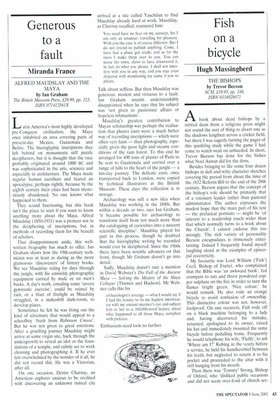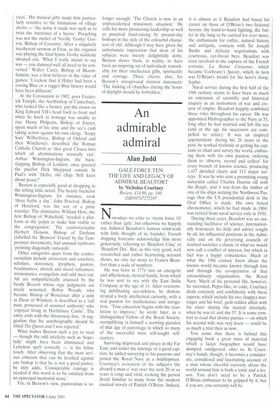Fish on a bicycle
Hugh Massingberd
THE BISHOPS by Trevor Beeson SCM, £19.95, pp. 248, ISBN 0334028671 Abook about dead bishops by a retired dean from a religious press might not sound the sort of thing to divert one as the shadows lengthen across a cricket field, but there I was eagerly turning the pages of this sparkling study while the game I had come to watch went on unheeded. In short, Trevor Beeson has done for the bishes what Noel Annan did for the dons.
Besides bringing to life some four dozen bishops in deft and witty character sketches covering the period from about the time of the 1832 Reform Bill to the end of the 20th century, Beeson argues that the concept of the bishop's role should be primarily that of a visionary leader rather than pastoral administrator. The author expresses the modest hope that the main part of his text — the prelatical portraits — might be 'of interest to a readership much wider than that which normally turns to a book about the Church'. I cannot endorse this too strongly. The rich variety of personality Beeson encapsulates is immensely entertaining. Indeed I frequently found myself laughing aloud at the examples of episcopal eccentricity.
My favourite was Lord William (`Fish') Cecil, Bishop of Exeter, who complained that the Bible was 'an awkward book', fed crumpets to rats and threw powdered copper sulphate on the fire in order to turn the flames bright green. 'Nice colour,' he would remark. He also rode an orange bicycle to avoid confusion of ownership. This distinctive colour was not, however, foolproof. On one occasion, Fish rode off on a black machine belonging to a lady and, having discovered his mistake, returned, apologised to its owner, raised his hat and immediately mounted the same bicycle before pedalling home. Frequently he would telephone his wife, 'Fluffy', to ask 'Where am I?' Robing in the vestry before a service, he held his handkerchief between his teeth, but neglected to return it to his pocket and proceeded to the altar with it still hanging from his mouth.
Then there was 'Tommy' Strong, Bishop of Oxford, who 'disliked public occasions and did not seem over-fond of church ser vices'. His musical gifts made him particularly sensitive to the limitations of village choirs — 'the noise it made was such as to twist the intestines of a hyena'. Preaching was not the metier of Neville 'Gorky' Gorton, Bishop of Coventry. After a singularly incoherent sermon at Eton, as the organist was playing the final hymn. Gorky suddenly shouted out, 'What I really meant to say was — you damned well all need to be converted.' Walter Carey, Bishop of Bloemfontein, was a firm believer in the value of games: 'I reckon that if Hitler had been a rowing Blue or a rugger Blue history would have been different.'
At the Coronation in 1902, poor Frederick Temple. the Archbishop of Canterbury, who looked like a farmer, put the crown on King Edward VII's head back to front and when he knelt in homage was unable to rise. Henry Philpotts, Bishop of Exeter, spent much of his time and the see's cash taking action against his own clergy. 'Soapy Sam' Wilberforce, Bishop of Oxford and then Winchester, described the Roman Catholic Church as 'that great Cloaca into which all abominations naturally run'. Arthur Winnington-Ingram, the backslapping Bishop of London, once greeted the pacifist Dick Sheppard outside St Paul's with 'Hello, old chap. Still keen about peace?'
Beeson is especially good at dropping in the telling little detail. The hearty bachelor Winnington-Ingram, for instance, took 'three baths a day'. John Percival, Bishop of Hereford, was the son of a prize wrestler. The diminutive William How, the first Bishop of Wakefield, 'needed a platform in the pulpit to make him visible to the congregation'. The controversialist Herbert Henson, Bishop of Durham (labelled the 'Brewers' Friend' by the Temperance movement), had unusual eyebrows 'pointing diagonally outwards'.
Other categories apart from the controversialists include aristocrats and courtiers, scholars, statesmen, prophets, pastors, headmasters, church and social reformers, missionaries, evangelists and odd men out. All are sympathetically assessed by the beady Beeson whose sage judgments are nicely seasoned. Robin Woods, who became Bishop of Worcester after a stint as Dean of Windsor, is described as a 'tall man, possessed of assumed authority' who 'enjoyed living in Hartlebury Castle'. The entry ends with the throwaway line, 'A suggestion that his autobiography should be titled The Queen and I was rejected,'
What makes Beeson such a joy to read — though the odd infelicity such as 'hopefully' might have been eliminated and Lyttelton spelt correctly — is his feline touch. After observing that the most serious criticism that can be levelled against any bishop is that he is not a good pastor, he slyly adds, 'Considerable courage is needed if this word is to be omitted from an episcopal memorial stone.'
Yet, in Beeson's view, pastoralism is no longer enough: The Church is now in an unprecedented missionary situation.' He calls for more pioneering leadership as well as practical fund-raising by present-day bishops in the style of the colourful characters of old. Although I may have given the unfortunate impression that most of his subjects were merely delightfully dotty, Beeson shows them, in reality, to have been an inspiring set of individuals remarkable for their intellectual gifts, spirituality and courage. Three cheers, also, for Beeson's unequivocal mission statement: The locking of churches during the hours of daylight should be forbidden.'























































































 Previous page
Previous page